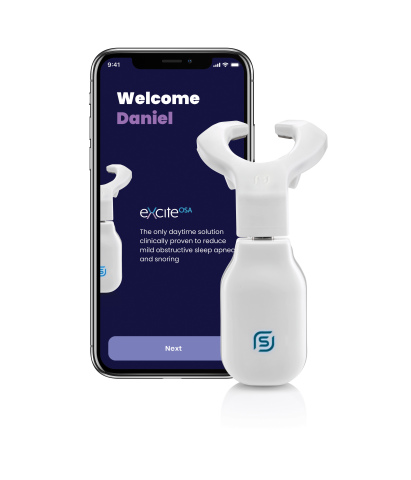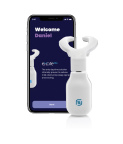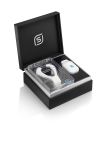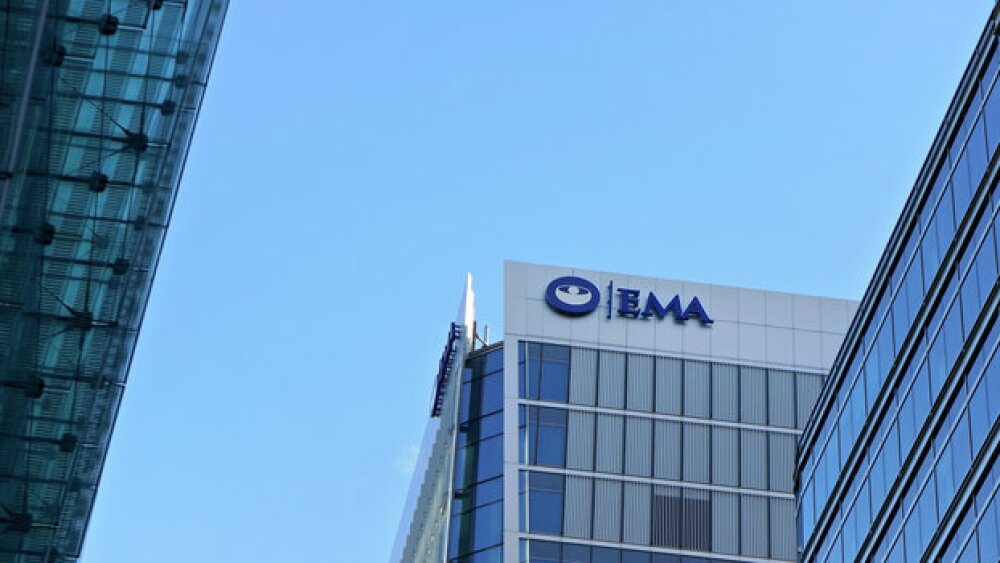Signifier Medical Technologies Ltd, a pioneer in patient-friendly therapies for sleep disordered breathing, announced that it has successfully raised $35 million in its Series D capital raise.
This press release features multimedia. View the full release here: https://www.businesswire.com/news/home/20210727005707/en/

The eXciteOSA® device and its proprietary Smartphone App (Photo: Business Wire)
The lead investors in the financing were Segulah Medical Acceleration, Angelus Venture Fund I L.P., Alan Howard (co-founder of Brevan Howard Asset Management) and Pioneer Healthcare Partners LP.
The proceeds of the financing will be directed towards commercialization of eXciteOSA in Signifier’s core target markets, continued development of Signifier’s proprietary digital patient and physician interface platforms, the generation of additional clinical data to reinforce the therapeutic efficacy of eXciteOSA, and progressing reimbursement.
OSA affects an estimated one billion adults aged 30 to 69 globally, with 60% having mild OSA.1 The disease is linked to a number of comorbidities, such as hypertension, stroke, heart failure, diabetes, depression, and an increased risk of road traffic accidents.2-9 In contrast to complex night-time wearables commonly used to treat OSA, eXciteOSA provides a low-burden, patient-friendly option of daytime therapy. Patients are guided by an intuitive Smartphone App, monitored remotely by their physician, and supported by Signifier’s world-class Patient Advocate support team. Extensive clinical trials and real-world usage indicate high (>80%) adherence to therapy, as confirmed by over 25,000 successfully completed daily therapies which have been recorded through our App.
Dr Asim Roy, a leading pulmonologist and the medical director of the Ohio Sleep Medicine Institute, commented: “My patients’ experience with eXciteOSA has been truly remarkable. The therapy has proven to be transformational in terms of its clinical efficacy and its impact on patients’ health and their quality of life. With the current challenges facing the sleep market, there could not be a better time for a viable, effective and easily accessible alternative to CPAP for mild OSA patients.”
Roger Gunnarsson, Managing Partner of Segulah Medical Acceleration, a fund which seeks to invest in and develop game changing businesses within medical technologies, said: “Segulah Medical is delighted to be co-leading Signifier Medical’s Series D financing. We are very excited about the prospects for eXciteOSA as a revolutionary daytime therapy to treat OSA. With an estimated 25% of the global adult population suffering from sleep disordered breathing, we believe that eXciteOSA will become the first line therapy for these patients.”
David Jarvis, Managing Partner of Angelus Partners, LLC, said: “We believe that Signifier Medical Technologies has created the most disruptive, non-invasive treatment for OSA that the market has seen in the past 20 years.”
“Our Series D fund raise will enable Signifier to bring our novel therapy to millions of patients suffering from sleep disordered breathing for whom there is today no effective treatment,” said Akhil Tripathi, the Chief Executive Officer of Signifier. “We are truly grateful for the strong support the Company has received from both our existing shareholders and new investors which provides strong validation of our technology, team and commercial strategy.”
About Signifier Medical Technologies
Signifier Medical Technologies is a pioneer in understanding and addressing the root causes of sleep disordered breathing. We are focused on the development and commercialization of innovative and non-invasive solutions for patients with conditions such as OSA and primary snoring. Founded in 2015, Signifier Medical Technologies is at the forefront of sleep therapy, focused on developing therapies that put patient experience and comfort first. Signifier has offices in London (UK), Needham (Massachusetts, USA) and Berlin (Germany).
About eXciteOSA
eXciteOSA is a revolutionary daytime therapy device for sleep disordered breathing. Clinically proven to target a common root cause of OSA and snoring, eXciteOSA helps to improve sleep quality and give patients better health and a better quality of life.10, 11
A major underlying cause of snoring and OSA is that patients have abnormalities in upper airway muscle function, or the tongue lacks endurance during sleep and falls back, blocking the upper airway. eXciteOSA works by using neuromuscular electrical stimulation (NMES) to exercise those muscles, using safe, low-intensity impulses to stimulate the intrinsic and extrinsic pharyngeal and tongue muscles directly to improve muscle tone, strength, and endurance.
Unlike other devices which are used while patients sleep, eXciteOSA is the first device which is used exclusively while awake. The device rests on the tongue and stimulates the pharyngeal and tongue muscles directly to improve their endurance, much like going to the gym would improve any other muscle. The device has been designed to target a wide range of patients with mild OSA, in addition to primary snoring, by building endurance of the weak tongue and surrounding muscles. This then prevents the muscles from collapsing in the first place, tackling a root cause of mild OSA and snoring.
About Obstructive Sleep Apnea and Snoring
Snoring is the most common cause of sleep deprivation, affecting around 42% of people.12 Nearly one billion adults aged 30 to 69 years are estimated to have obstructive sleep apnea (OSA) globally.3 OSA and snoring are problems for many people whose tongue muscles relax during sleep, causing partial airway collapse and a decreasing oxygen intake, which causes the sleeper to stop and restart breathing during sleep, often jolting them awake.14
OSA is a serious medical condition associated with health problems like high blood pressure and increased risks of heart attack, stroke, or death.13 OSA and snoring do not just affect those suffering from them, but also their partners and family members, consequently putting strain on relationships.14, 15
References
- Benjafield, A. V., Ayas N T, Eastwood P R et al. Estimation of the global prevalence and burden of obstructive sleep apnoea: a literature-based analysis. Lancet Respir Med 2019; 7: 687-698.
- Peppard PE, Young T, Palta M, et al. Prospective study of the association between sleep-disordered breathing and hypertension. N Engl J Med. 2000; 342:1378–1384. [PubMed: 10805822]
- Gottlieb DJ, Yenokyan G, Newman AB, et al. Prospective study of obstructive sleep apnea and incident coronary heart disease and heart failure: the sleep heart health study. Circulation. 2010;122:352– 360. [PubMed: 20625114]
- Yaggi HK, Concato J, Kernan WN, et al. Obstructive sleep apnea as a risk factor for stroke and death. N Engl J Med. 2005; 353:2034–2041. [PubMed: 16282178]
- Redline S, Yenokyan G, Gottlieb DJ, et al. Obstructive sleep apnea- hypopnea and incident stroke: The Sleep Heart Health Study. Am J Respir Crit Care Med. 2010; 182:269–277. [PubMed: 20339144]
- Peker Y, Hedner J, Norum J, et al. Increased incidence of cardiovascular disease in middle-aged men with obstructive sleep apnea: a 7-year follow-up. Am J Respir Crit Care Med. 2002; 166:159– 165. [PubMed: 12119227]
- Marin JM, Carrizo SJ, Vicente E, et al. Long-term cardiovascular outcomes in men with obstructive sleep apnoea-hypopnoea with or without treatment with continuous positive airway pressure: an observational study. Lancet. 2005; 365:1046–1053. [PubMed: 15781100]
- Peppard PE, Szklo-Coxe M, Hla KM, et al. Longitudinal association of sleep-related breathing disorder and depression. Arch Intern Med. 2006; 166:1709–1715. [PubMed: 16983048]
- Kendzerska T, Gershon AS, Hawker G, et al. Obstructive sleep apnea and incident diabetes: a historical cohort study. Am J Respir Crit Care Med. 2014; 190:218–225. [PubMed: 24897551]
- Baptista et al. Daytime Neuromuscular Electrical Therapy of Tongue Muscles in Improving Snoring. 2021
- Kotecha. et al. A novel intraoral neuromuscular stimulation device for treating sleep-disordered breathing. Sleep Breath. 2021.
- Davey, M. J. Epidemiological study of snoring from a random survey of 1075 participant. British Snoring and Sleep Apnoea Association. 2002; Available at: https://britishsnoring.co.uk/pdf/epidem.pdf
- Levy P, Kohler M, McNicholas WT, et al. Obstructive sleep apnoea syndrome. Nat Rev Dis Primers 2015; 1: 15015.
- Johnson KG and Johnson DC. Frequency of sleep apnea in stroke and TIA patients: a meta-analysis. J of Clinical Sleep Med 2010;6(2):131-7
- Luyster FS. Impact of Obstructive Sleep Apnea and Its Treatments on Partners: A Literature Review. J Clin Sleep Med. 2017;13(3):467-477.
For more information, please visit www.signifiermedical.com or www.exciteosa.com
View source version on businesswire.com: https://www.businesswire.com/news/home/20210727005707/en/
Contacts
JPA Health
+1 (202) 591-4000
+44 (0) 20 3884 0657
signifier@jpa.com
Signifier Medical Technologies
+1 (844) 645-3672
+44 (0) 20 7096 0586
info@signifiermedical.com
Kate Perry
Senior Director
JPA Health
+44 (0) 20 3884 0650
kperry@jpa.com
Source: Signifier Medical Technologies Ltd,








